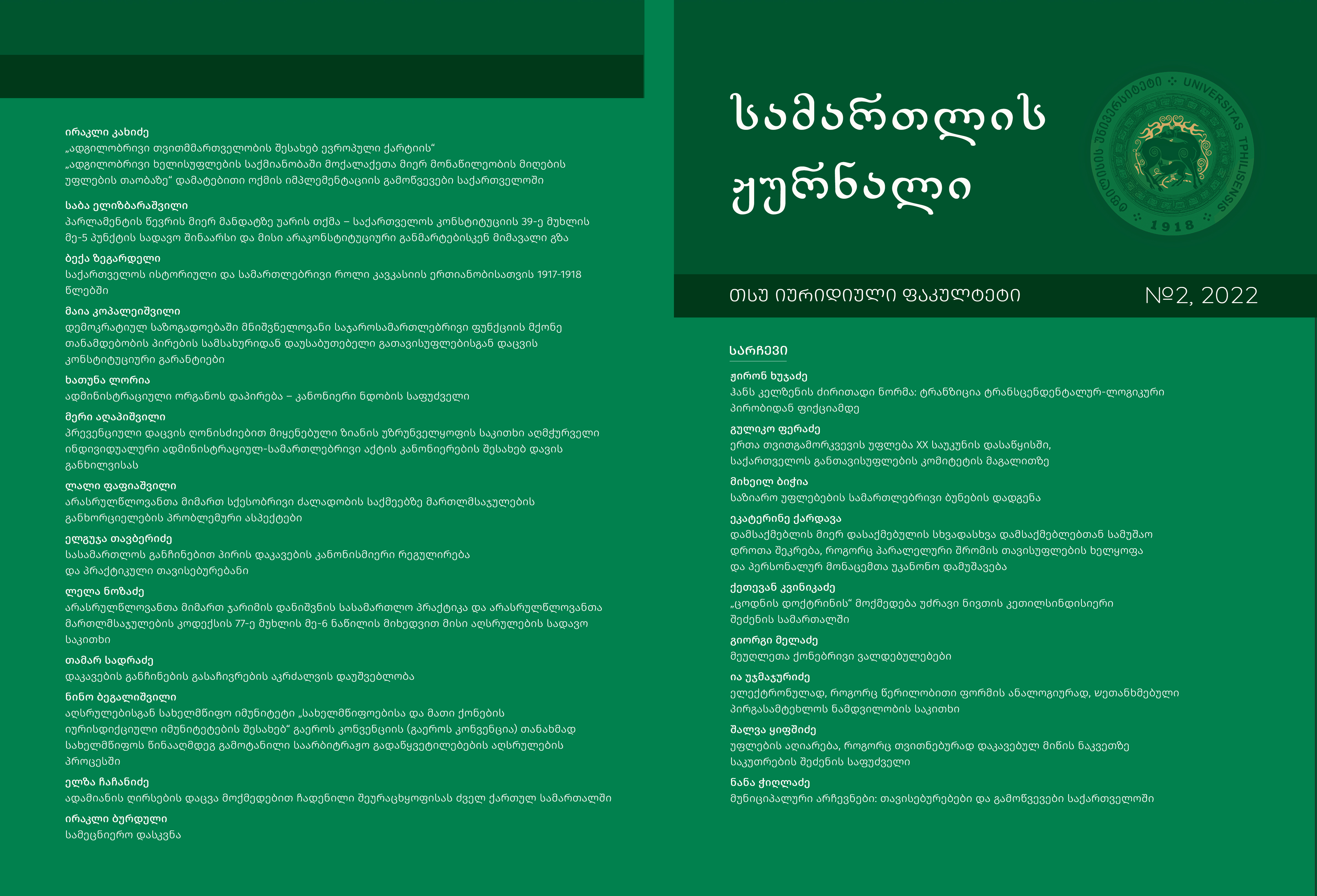მუნიციპალური არჩევნები: თავისებურებები და გამოწვევები საქართველოში
DOI:
https://doi.org/10.60131/jlaw.2.2022.7024საკვანძო სიტყვები:
არჩევნები, ადგილობრივი თვითმმართველობა, მუნიციპალიტეტის წარმომადგენლობითი ორგანო, მუნიციპალიტეტის აღმასრულებელი ორგანო, თვითმმართველი ერთეული, საარჩევნო სისტემა.ანოტაცია
დამოუკიდებლობის აღდგენის შემდეგ, 90 - იან წლებში, სახელმწიფოებრივი მნიშვნელობის სხვა სასიცოცხლო საკითხებთან ერთად, აქტიურად დაიწყო ქართულ რეალობასთან მუნიციპალური დემოკრატიის შესისხლხორცების პროცესი. საქართველოში ადგილობრივი მართვის სისტემის სრულყოფას მთელი რიგი ფაქტორები უშლიდა ხელს, ამიტომ, იგი დღესაც რეფორმირების პროცესშია. უმნიშვნელოვანესი კომპონენტი, რომელიც მუნიციპალურ ორგანოებს თანამედროვე საერთაშორისო სტანდარტების შესაბამისად ფუნქციონირების შესაძლებლობას აძლევს და ეფექტური თვითმმართველობის გარანტიას წარმოადგენს, მათი ფორმირების წესია.
არჩევითობა, ანუ ხალხის თანამონაწილეობის შესაძლებლობა მუნიციპალური ორგანოების შექმნასა და საქმიანობაში, ადგილობრივი თვითმმართველობის უფლების განხორციელების თვალსაჩინო გამოხატულებაა. ნიშანდობლივია, რომ მუნიციპალური არჩევნები, თავისი არსით, მთელი რიგი თავისებურებებით ხასიათდება და მკვეთრად განსხვავდება ცენტრალური სახელისუფლებო ინსტიტუტების არჩევნებისგან. შესაბამისად, ეროვნული სახელმწიფოები, მათ შორის საქართველოც, ცდილობენ საკუთრი ქვეყნის პოლიტიკურ და სოციალურ რეალობას მორგებული და ტრადიციების ამსახველი კანონმდებლობა შექმნან, რომელიც ადგილობრივი თვითმმართველობის ნამდვილი შინაარსით რეალიზაციას და მუნიციპალური ერთეულის მოსახლეობის ჩართულობის შესაძლებლობას უზრუნველყოფს. შესაბამის საარჩევნო კანონმდებლობაში არაერთგზის განხორციელდა არსებითი ხასიათის ცვლილებები, რომლებმაც პოზიტიური გავლენა იქონია, უპირატესად, 2021 წლის 2 ოქტომბრის ადგილობრივი თვითმმართველობის არჩევნების შედეგზე. ამასთან, მუნიციპალური საარჩევნო კანონმდებლობა და პრაქტიკა კვლავ დგას გამოწვევების წინაშე, რომელზე პასუხზეც დიდწილადაა დამოკიდებული საქართველოს, როგორც დემოკრატიული და სამართლებრივი სახელმწიფოს მომავალი.
წყაროები
The Constitution of Georgia, 24/08/1995;
European Charter of Local Self-Government, 15/10/1985;
Organic Law of Georgia, Election Code of Georgia 27/12/2011;
Aleksidze T., Equal right of the electoral vote and an equal weight of electoral vote - international standards and local practice, Elections and Democracy, Journal No. 6, 2021, 36, 37 (in Georgian).
Arsenidze R., Democratic Republic, Chronicles of Georgian Constitutionalism, Zviad Kordzadze Publishing House, 2016, 61 (in Georgian).
Chavchavadze I., Publicist Letters, Volume IV, Life and Law, Letter Four, Tbilisi, 1987, 324 (in Georgian);
Ghlonti V., The Meaning of the Commune - on the Destination, “Eroba” newspaper, the the Union of Nations, No. 11 - 12, 1920, 22 (in Georgian);
Kandelaki K., History of Elections of Local Self-government Bodies, Elections and Democracy, Election Journal, No. 5, 2021, 7 (in Georgian).
Khmaladze V., New electoral system for the local self-government elections of October 2, 2021 - better representation in the search for democracy?, Elections and Democracy, Election Journal No. 6, 2021, 7-8, 11 (in Georgian);
Khubua G., “Parliamentization” of local self-government: risks and challenges, elections and democracy, election journal No. 7, 2021, 40-44 (in Georgian);
Losaberidze D., Kandelaki K., Abuladze M., Konjaria O., Local self-government, Green Caucasus, 2016, 126, 130 (in Georgian).
Losaberidze D., Report on Politics, Local Self-Government in Georgia, 1991-2014, International Center for Civic Culture, 2015, 15 (in Georgian);
Melkadze O., Georgian Municipalism, Tbilisi, 2009, 110 (in Georgian);
Election observation mission of the OSCE Office for Democratic Institutions and Human Rights (OSCE/ODIHR), local elections in Assembly, 2 October 2021 (in Georgian);
“Amendments to the Election Code: Assessment and Recommendations”, International Society for Fair Elections and Democracy, Transparency International - Georgia, 2021;
Decision of the Constitutional Court of Georgia on the case of Georgian citizen Kakha Kukava vs. Parliament of Georgia, No. 3/3/600, May 17, 2017;
International Election Observation Mission Georgia - Elections of municipal bodies, second round, October 30, 2021 (in Georgian);
Long-Term Small-Scale Election Evaluation Mission, Georgia 2021 Local Government Elections, Election Evaluation Report, National Democratic Institute, (NDI) September 1 - November 5, 2021, 2, 5-7, 11 (in Georgian);
Report on the October 2, 2021 elections of the representative body of the municipality - the assembly and the mayor of the self-governing city/self-governing community, (August 2 - November 13), CESKO, December 2021;
“Unity” magazine, No. 158, 25. 07. 1918.
Venice Commission – ODIHR Joint Opinion on the Draft Election Code of Georgia, CDL-AD(2011)043;
Decision of the Constitutional Court of Georgia on the case of Georgian citizen Giorgi Ugulava against the Parliament of Georgia, No. 3/2/574, May 23, 2014;
Decision of the Constitutional Court of Georgia on the case of Citizens of Georgia - Uta Lipartia, Giorgi Khmelidze, Eliso Janashia and Gocha Ghadua against the Parliament of Georgia, No. 1/2/213,243, February 16, 2005;
Decision of the Constitutional Court of Georgia on the case of “Citizens of Georgia - Salome Qinqladze, Nino Kvetenadze, Nino Odisharia, Dachi Janelidze, Tamar Khitarishvili and Salome Sebiskveradze vs the Parliament of Georgia", No. 3/2/588, April 14, 2016.
ჩამოტვირთვები
გამოქვეყნებული
როგორ უნდა ციტირება
გამოცემა
სექცია
ლიცენზია

ეს ნამუშევარი ლიცენზირებულია Creative Commons Attribution-ShareAlike 4.0 საერთაშორისო ლიცენზიით .









